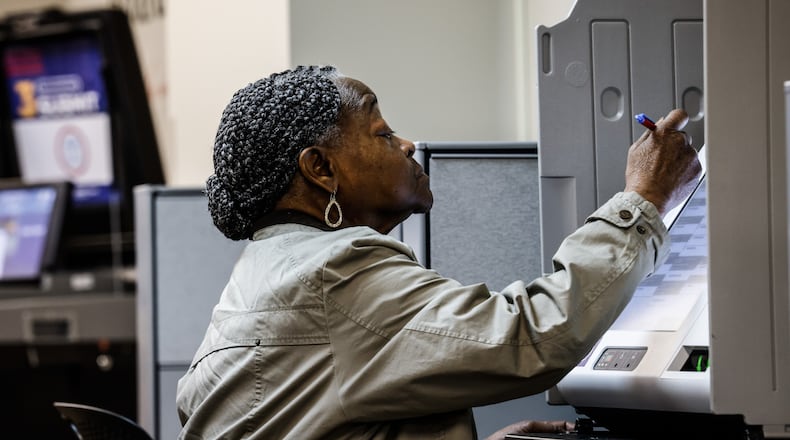Look Ahead America’s founder and executive director, Matt Braynard, last week announced that the group had funds to conduct a “pre-election audit of voter lists in nine states to identify voters that are candidates for removal due to illegitimate addresses or having moved permanently out of state.”
The states chosen are Arizona, Florida, Georgia, North Carolina, Nevada, Ohio, Pennsylvania, Virginia, and Wisconsin. The group will also “challenge potentially illegal ballots” and use “local activist groups” for additional research and voter challenges, according to the news release.
“We believe that if we apply this rigorous hygiene before the election, we will help prevent illegal ballots from being cast and, just as important, restore confidence in the elections among those who may have doubts,” Braynard said.
With former President Donald Trump and multiple Republican candidates spreading the falsehood that the 2020 election was stolen from Trump, conservative groups in several states are questioning absentee ballots cast in this year’s primary elections and challenging voter registrations in multiple states, according to a Sept. 28 New York Times story.
Braynard testified as an “expert witness” in challenges to the 2020 election in Arizona, Georgia and Wisconsin, raised money for challenges in Pennsylvania and Michigan and held rallies for people charged in the Jan. 6, 2021 assault on the U.S. Capitol by Trump supporters, according to the Washington Post.
Multiple investigations, election audits and court rulings nationwide, along with Trump’s then-Attorney General William Barr, found no evidence of widespread fraud or election problems that would have changed the fact that Democrat Joe Biden won the majority of the popular and electoral college votes. Experts say cases of voter fraud are extremely rare.
Credit: JIM NOELKER
Credit: JIM NOELKER
”A number of bad actors and grifters are seeking attention by casting doubt on America’s proven safe elections. The goal is to undermine public confidence,” said Sarah Greathouse, deputy director of the Montgomery County Board of Elections. “There is not widespread fraud. After years of voter records maintenance, Ohio’s voter lists are cleaner than they have ever been. Every election in Ohio is audited and (that has) repeatedly proven the accuracy of our elections.”
Brian Sleeth, president of the Ohio Association of Election Officials and director of the Warren County board, urged people to make sure they are registered by going to the Ohio Secretary of State’s VoteOhio.gov website or calling their local board of elections.
“Ohioans should know that every registered voter is eligible to participate in our democracy,” said Sleeth. “Local election officials will continue to ensure that Ohio has a fair, open and accurate elections system.”
Credit: Lynn Hulsey
Credit: Lynn Hulsey
The deadline to register for the Nov. 8 election was Tuesday and early voting starts today. .
Registered voters in Ohio who moved or had a name change but did not update their registration can still vote provisionally at the precinct where they currently live, Greathouse said.
“Your vote will count when election officials verify your eligibility to vote,” Corba said. “If you are denied a provisional ballot, make a report to your local board of elections. You can also call the Election Protection Hotline at 1-866-OUR-VOTE.”
Voters who have moved out of state and registered there are not obligated to inform Ohio that they have left the state, but they may only legally vote in the state where they reside. They can use a form on the Ohio Secretary of State’s website to cancel their registration in this state.
An official routine process of voter roll maintenance in Ohio results in names of voters who are deceased, inactive or live elsewhere being removed from voter registration rolls after proper notification is given.
“We have not heard of Look Ahead America and do not know how they are funded, but they should be pleased to know that in Ohio, county boards of elections routinely scour their voter rolls to ensure they are accurate and updated,” said Rob Nichols, spokesman for Ohio Secretary of State Frank LaRose.
“However, Ohio’s voter registration system is relatively unique in that it’s one of the very few that requires county boards to manage their own voter registration database. A more standardized statewide registration system could go a long way toward improving the accuracy of the voter rolls and moving Ohio forward.”
Area boards of election have not seen an influx of challenges to voter registrations, according to interviews with board officials.
The Montgomery County board has had just 15 recent challenges, only two of which may ultimately warrant a hearing, Greathouse said.
Boards follow state law, the Ohio Elections Officials Manual and directives from the Ohio Secretary of State in handling challenges to registration or absentee ballots.
“Always open any mail sent from the board of elections,” Greathouse said. “If your local board of elections determines that a challenge warrants a hearing, the (manual) clearly states that the voter must be notified by mail of the date and time of the hearing.”
She and Sleeth emphasized that only a precinct election official is allowed to challenge voters at the polls on Election Day.
“At a polling location, the only people that are allowed to be inside of a polling location are voters and officially appointed observers,” Sleeth said. “There are not going to be large groups of people inside of a polling location confronting voters.”
Follow @LynnHulseyDDN on Twitter and Facebook
About the Author


